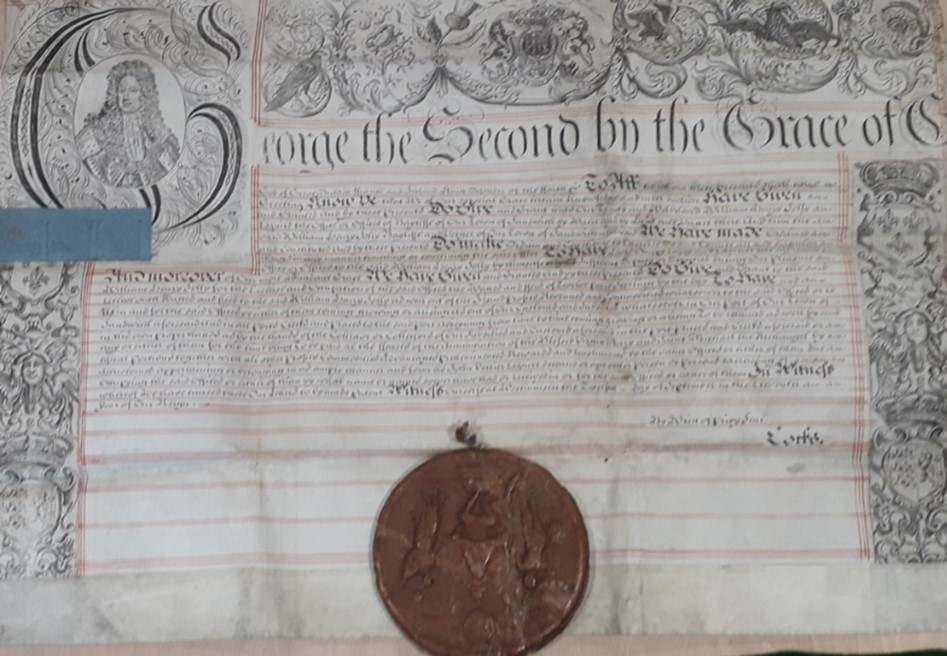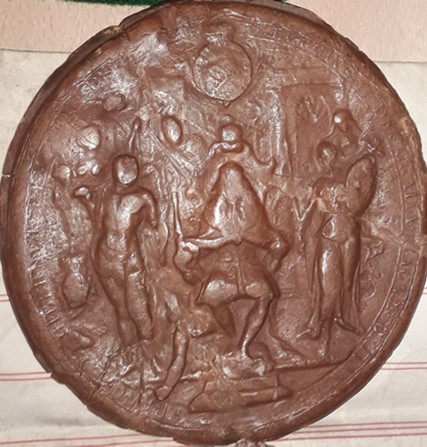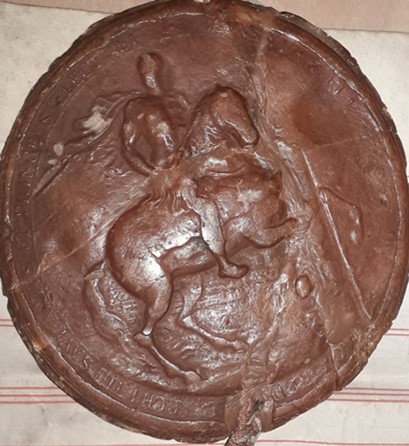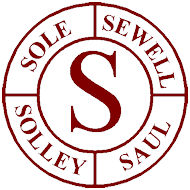By Peregrine Solly
This article was published in the December 2022 edition of Soul Search, the Journal of The Sole Society
One of the family documents that I have inherited is a parchment that still has George II’s seal attached. It records the appointment of William Henry Solly as the Bailiff and Verger at Sandwich in 1738 and confirms that he was to be paid the sum of twelve pence a day (£5.50 today) for collecting various customs dues. He was also allowed to keep some of the profits. A transcript of the document is below.



| George the Second by Grace of God of Great Britain fFrance and Ireland King and Defender of the fFaith to whom these presents shall come Greeting. Know Ye that we of our special grace retain knowledge and meer motion Have Given and granted and by these presents Do Give and Grant unto our Trusty and Well beloved William Henry Solly Esquire the Office or Offices of Bayliffe of Our Town of Sandwich by Water and by Land and Verger there And to him the said William Henry Solly Bayliffe and Verger of Our Town of Sandwich aforesaid We have made Ordained and Constituted to Exercise So to Execute all and singular things in any manner touching or concerning the said Office To Have Hold Occupy Enjoy and Exercise the aforesaid Office or Offices to the said William Henry Soly by himselfe or by Sufficient Deputy or Deputies during Our Pleasure. And Moreover of Our more Abundant Grace We have Given And by these presents Do Give and Grant to the said William Henry Solly for the Exercise and Occupation of the said Offices the Wages and ffees of Twelve Pence Sterling by the day. To Have and receive such wages and ffees to the said William Henry Solly as well as out of such profit Retained and Commodities of Our Customs and Subsidies in Our Port of Our Town of Sandwich whatsoever by these presents Do Make Ordain and Constitute wages and fees of twelve pence sterling by the day as well as out of the Profits received and Commodities whatsoever to the said office rising out of customs and subsidies whatsoever in Our Port town of Sandwich aforesaid And in all ports creeks and places to the said port adjoyning from time to time coming growing or arising to be retained as well by and in his own proper hands as by the hands of the Collector or Collectors of Our subsidies and Customs aforesaid in the Port places and Creeks aforesaid or any or other of them for the time being to b paid at the ffeasts of the Annunciation of the Blessed Virgin Mary Virgin and Saint Michael the Archangel by equal portions together withal other Profits Commodities Advantages Rewards and Emoluments to the same Offices or either of them due accustomed appertaining or belonging in as ample manner and form as John Verrier deceased or any other person or persons exercising or Occupying the said Offices or either of them by what name or names forever have had or received in or for the same Offices or either of them In Witness where we have caused these Our Letters to be made Patent Witness Ourselfe at Westminster the Twelfth day of September in the Eleventh Year of Our Reign By writ of Privy Seal COCKS |
William Henry Solly (1714-1790) was the youngest son of Richard Solly “the Younger” who featured in my earlier articles on lighthouses and canopy bearers, and who was mayor of Sandwich three times and a major figure in the town. William Henry was the youngest of Richard’s thirteen children (ten boys and three girls) and became a solicitor as far as I can work out. Like his father, he was much involved in Sandwich’s affairs and was made Bailiff in 1738 at the age of 24, elected as a Jurat (Alderman) becoming the Mayor of Sandwich in 1747 aged 33. According to two other records, he was also the Collector of Customs for Sandwich.
The Solly family were Kentish farmers with lands north and east of Sandwich, but the Eighteenth Century saw my family get involved in collecting customs dues for the Crown. Smuggling was a rife along the South Coast (quite glamorously portrayed in Poldark), so being one of the bailiffs or collectors was both onerous and not without its dangers – as we know from a Treasury report from the year before William Henry’s appointment:
Report to the Treasury from said Commissioners, dated 1737, May 27, on the memorial of Philemon Phillips, Master in His Majesty’s Navy. Memorialist alleges that having taken a survey of the Kentish coast he finds that at St. Margaret’s Bay and the three neighbouring parishes there are about 200 families which subsist by smuggling: there are upwards of 200 open boats, carrying from four to five hands, each employed in bringing the brandy and other goods from France, Flanders, &c., which goods are run between the North and South Foreland, near 100 decked vessels from 15 to 35 tons, belonging to Folkestone and carrying from six to ten hands each, are employed in the like trade. To prevent this memorialist proposes to station cutters, boats with sitters, &c., watch vessels, or officers variously at King’s Gate or Bartholomew Gate, the mouth of Sandwich river, in the Downs, St. Margaret’s Bay, Dover, Folkestone, Dymchurch. Have had both memorial and proposals examined by Mr. Collyer, Surveyor General of Kent, who certifies that great quantities of tea, brandy, and other goods are daily landed on the coast of Kent, and from thence conveyed to London by great gangs of smugglers, who come down on the coast with firearms, and run their goods in defiance of the officers. Advise a trial of memorialist’s proposals for six months”. [Customs Book XIV. pp. 231–3.]
Fortunately, being involved in customs collections had its upside and William Henry died a wealthy man, leaving his son Joseph the sum of £2,000 when he came of age (the equivalent of £174,500 today).
The roles of Bailiff and Verger date back to the time of Edward I and were largely about keeping control of goods coming into England from the Continent as well as dealing with local crime and misdemeanours. As the parchment shows, the Bailiff not only seems to have had a free rein collecting “the King’s dues” but was also allowed to profit from exercise of his duties. Although the parchment talks about Bailiff and Verger, they were separate roles. The Verger was the Bailiff’s deputy or sergeant and worked with his deputies and collectors to taxing visiting merchants and traders; although there were numerous exemptions: “Thefe are the perfons who are free in the faid town and pay no cuflom; namely, the people of the cinque ports and their members. The people of Canterbury who pay fcot and lot within the city. The people of London who pay fcot and lot within the walls. The people belonging to the archbifhop of Canterbury, down lying and up rifing and pot boilers within the archbifhoprick. The people of the hundred of Milton, down lying and up rifing and pot boilers within the faid hundred. The people of Battle. The people of st Alban’s. The people of Antwerp. The count of Gynes and all his free people”. NB “fcot and Lot” referred to householders, normally merchants, who got a way “scot-free”. [William Boys Collections of the History of Sandwich c 1780]
However, as well as being made Bailiff, William Henry later became the Collector of Sandwich, as we know from a local notice from 17 March 1745 which recorded that: “Whereas the Warehouse near the Custom-house (in which was secured a considerable quantity of brandy and wine under the King’s locks) was on or before the tenth day of February last broke open and a great quantity of brandy stolen and taken away; for the better discovering and bringing to justice the person or persons concerned in the fact aforesaid, the Hon. Commissioners of his Majesty’s Customs do hereby offer a reward of fifty pounds to any person or persons who shall make such discovery; to be paid on conviction of one or more of the offender or offenders. W.H. Solly Collector Thomas Kite Controller”.
William Henry is also described as Collector in the Gentleman’s Magazine of 1805 which recorded his wife’s death:
“In her 87th year, Mrs Christian Solly relict of William Henry Solly Esq of Sandwich, late collector of customs of that place and only child of Thomas Wickes Esq formerly collector of customs at Dover”.
I had always assumed that the roles of Bailiff and Collector were different; however, having re-read William Boys’ History of Sandwich (page 475/512 on-line) I am not so sure since their duties are very similar. Boys’ History also includes a transcript of George III’s proclamation appointing John Matson as Bailiff in October 1770. It is almost identical to my parchment and mentions that Matson was appointed in succession to William Henry Solly after he died; just as in William Henry’s parchment it states that he is taking over from Sir John Verrier, the previous Bailiff, who had died shortly before, implying that the Bailiff’s role was for life.
If the Bailiff’s role really was for life, it would explain why the position was a royal appointment, why William Henry’s parchment has survived all these years, and perhaps how he was able to amass his wealth. However, it leaves a question about the role of the Collector – was this the same as the Bailiff’s or was it a different and possibly junior role? If any can shed any light on this, I will be very grateful for their help.
